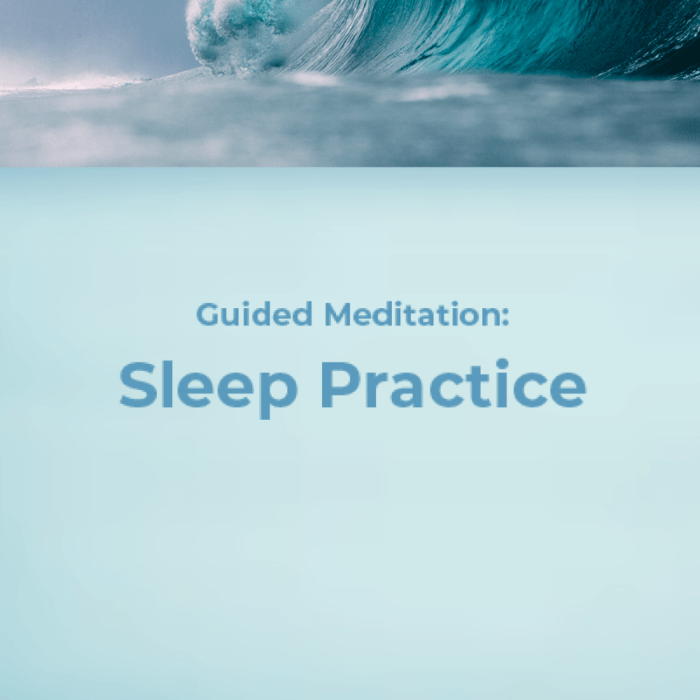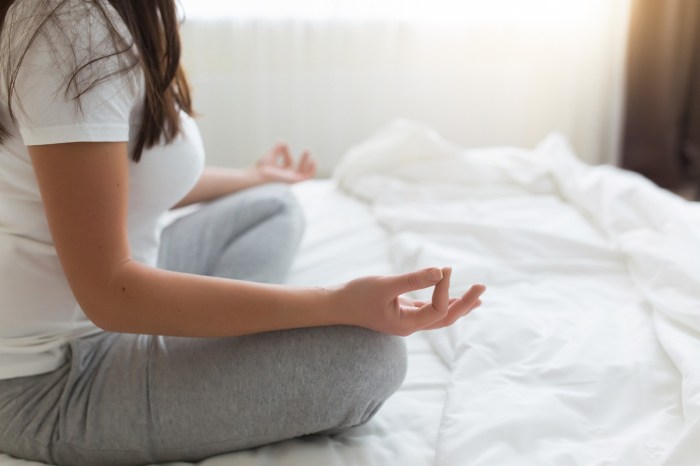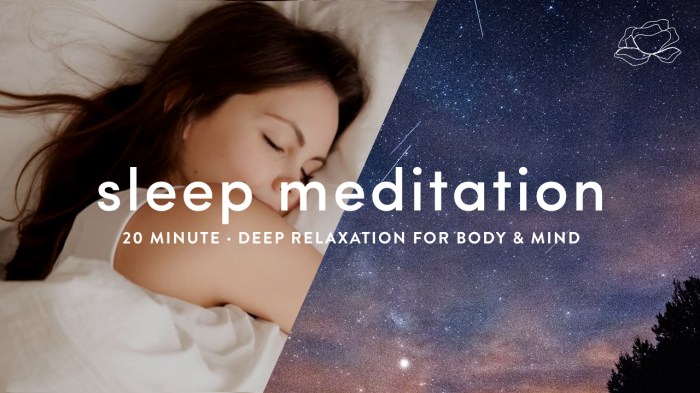Kicking off with 6 Guided Meditations for Better Sleep, this comprehensive guide will explore the benefits, types, techniques, and resources available to enhance your sleep quality through guided meditation.
Delve into the world of guided meditations tailored for better sleep and discover the transformative power they hold in improving your overall well-being.
Benefits of Guided Meditations for Better Sleep

Guided meditations offer numerous benefits that can significantly improve the quality of your sleep. These benefits include relaxation, stress reduction, and enhanced mindfulness, all of which contribute to a more restful and rejuvenating night’s sleep.
Improved Sleep Quality
Guided meditations help to calm the mind and relax the body, creating the ideal conditions for falling asleep and staying asleep throughout the night. By focusing on deep breathing, visualization, and progressive muscle relaxation, guided meditations can effectively quiet the mind and reduce racing thoughts that often prevent us from getting a good night’s rest.
Science Behind Guided Meditations for Sleep
Research has shown that practicing guided meditations before bedtime can lower cortisol levels, decrease heart rate, and promote the release of feel-good hormones like serotonin and melatonin. These physiological changes signal to the body that it’s time to rest, making it easier to drift off to sleep and stay asleep longer.
Personal Testimonials
Many individuals who incorporate guided meditations into their bedtime routine have reported significant improvements in their sleep patterns. They often describe feeling more relaxed, less anxious, and more at peace before going to bed, leading to a deeper and more restorative sleep experience. By consistently practicing guided meditations, these individuals have been able to break free from insomnia and other sleep disturbances, paving the way for a more energized and productive day ahead.
Types of Guided Meditations for Better Sleep

When it comes to guided meditations for better sleep, there are various types that cater to different preferences and needs. Each type offers a unique approach to help calm the mind and body, promoting relaxation and deep restful sleep.
1. Body Scan Meditations
Body scan meditations involve focusing on each part of the body progressively, releasing tension and promoting relaxation. By bringing awareness to different body parts, these meditations help in reducing physical discomfort and promoting a sense of calmness.
2. Visualization Meditations
Visualization meditations involve creating mental images of peaceful scenes or scenarios that help in calming the mind and inducing sleep. By engaging the imagination, these meditations can transport the mind to a serene place, facilitating relaxation and easing into sleep.
3. Breath Awareness Meditations
Breath awareness meditations focus on observing the breath to anchor the mind in the present moment. By bringing attention to the inhalation and exhalation, these meditations help in calming the mind, reducing racing thoughts, and preparing the body for sleep.
4. Loving-Kindness Meditations
Loving-kindness meditations involve cultivating feelings of compassion and love towards oneself and others. By practicing kindness and compassion, these meditations can promote a sense of emotional well-being, reducing stress and anxiety that may interfere with sleep.
5. Progressive Muscle Relaxation
Progressive muscle relaxation meditations involve tensing and relaxing different muscle groups systematically. By releasing physical tension, these meditations help in promoting relaxation and preparing the body for deep, restorative sleep.
6. Mindfulness Meditations
Mindfulness meditations involve observing thoughts, emotions, and sensations without judgment. By cultivating awareness and acceptance of the present moment, these meditations can help in quieting the mind, reducing stress, and promoting better sleep quality.Explore these different types of guided meditations for better sleep to find the one that resonates with you and supports your journey towards a restful night’s sleep.
How to Practice Guided Meditations for Better Sleep
To fully benefit from guided meditations for better sleep, it is important to prepare yourself mentally and create an optimal environment for relaxation. Here are some steps to help you practice guided meditations effectively for improved sleep quality.
Preparing for a Guided Meditation Session
- Find a quiet and comfortable space: Choose a peaceful environment where you can relax without distractions.
- Set the mood: Dim the lights, play calming music, or use essential oils to create a soothing atmosphere.
- Get into a comfortable position: Sit or lie down in a position that allows you to fully relax your body.
- Take deep breaths: Begin by taking slow, deep breaths to calm your mind and body before starting the meditation.
Optimal Time and Environment for Practicing Guided Meditations
- Choose the right time: Practice guided meditations for better sleep before bedtime to unwind and prepare your mind for rest.
- Avoid distractions: Turn off electronic devices and create a peaceful environment to help you focus on the meditation.
- Use headphones: If you are using a guided meditation audio, consider using headphones for a more immersive experience.
Tips for Maintaining Focus and Relaxation
- Focus on your breath: Pay attention to your breathing throughout the meditation to stay present and relaxed.
- Visualize calming scenes: Imagine yourself in a peaceful place to help reduce stress and promote relaxation.
- Acknowledge distractions: If your mind starts to wander, gently bring your focus back to the guided meditation.
- Practice regularly: Consistency is key, so make guided meditations a part of your nightly routine for better sleep.
Techniques Used in Guided Meditations for Better Sleep

Guided meditations for better sleep often incorporate various techniques to help calm the mind and body before bedtime. These techniques are designed to promote relaxation, reduce stress, and prepare the body for a restful night’s sleep.
Deep Breathing
- Deep breathing is a common technique used in guided meditations for better sleep.
- By focusing on slow, deep breaths, individuals can activate the body’s relaxation response, reducing heart rate and promoting a sense of calm.
- Deep breathing helps to release tension and stress, making it easier to drift off into a peaceful sleep.
Visualization
- Visualization involves imagining peaceful and calming scenes or scenarios during a guided meditation.
- By visualizing serene settings such as a beach or a forest, individuals can create a mental escape from the stresses of the day.
- This technique helps to shift the focus away from racing thoughts and worries, allowing the mind to relax and prepare for sleep.
Body Scans
- Body scans are another technique commonly used in guided meditations for better sleep.
- During a body scan, individuals focus on each part of their body, starting from the toes and moving up to the head.
- This technique helps to increase body awareness, release muscle tension, and promote a sense of relaxation throughout the entire body.
Creating a Personalized Guided Meditation Routine for Better Sleep: 6 Guided Meditations For Better Sleep

To optimize the benefits of guided meditations for better sleep, it is essential to create a personalized routine that caters to your individual needs and sleep issues. By tailoring your meditation practice, you can address specific concerns and establish a bedtime routine that promotes restful and rejuvenating sleep.
Customizing Guided Meditation Practices
- Identify your sleep challenges: Begin by recognizing the specific issues that disrupt your sleep, such as stress, anxiety, or racing thoughts.
- Choose suitable meditation techniques: Select guided meditations that focus on relaxation, deep breathing, body scan, or visualization to target your sleep-related concerns.
- Modify meditation scripts: Adapt existing guided meditation scripts or recordings by incorporating affirmations, imagery, or soothing music that resonate with your sleep needs.
Tailoring Guided Meditation for Sleep Issues
- Addressing insomnia: Opt for guided meditations that promote relaxation, calm the mind, and induce a state of tranquility to combat insomnia and promote sound sleep.
- Alleviating anxiety: Choose meditations that emphasize mindfulness, deep breathing, and body awareness to reduce anxiety levels and prepare the mind for restful sleep.
- Improving sleep quality: Focus on guided meditations that enhance sleep quality by promoting deep relaxation, stress relief, and a sense of inner peace before bedtime.
Integrating Guided Meditations into Bedtime Routine
- Consistency is key: Establish a regular bedtime routine that includes guided meditations as a calming and soothing practice to signal your body and mind that it’s time to unwind and prepare for sleep.
- Create a peaceful environment: Set up a comfortable and serene space for meditation, free from distractions and with soft lighting or soothing sounds to enhance relaxation.
- Practice gratitude and reflection: Incorporate elements of gratitude, positive affirmations, and reflection into your guided meditations to cultivate a peaceful mindset and promote better sleep.
Additional Resources and Tools for Guided Meditations for Better Sleep

To enhance your guided meditation practice for better sleep, there are various resources and tools available that can further support and deepen your experience. Whether it’s through technology, products, or complementary practices, these resources can help create a more conducive environment for restful sleep.
Guided Meditation Apps and Websites
- Headspace: Offers guided meditations specifically designed to improve sleep quality and duration.
- Calm: Features sleep stories and guided meditations to help you relax and unwind before bedtime.
- Insight Timer: Provides a wide range of guided meditations for sleep, along with a supportive online community.
Sleep-Enhancing Products
- Sleep Masks: Block out light and create a dark environment conducive to sleep during guided meditation sessions.
- Essential Oils: Use calming scents like lavender or chamomile to promote relaxation and reduce stress before bedtime.
- Meditation Cushions: Support proper posture and comfort during meditation, helping you relax more deeply.
Complementary Practices, 6 Guided Meditations for Better Sleep
- Yoga: Gentle yoga poses and stretches can help release tension in the body and calm the mind before meditation and sleep.
- Mindfulness Exercises: Practicing mindfulness throughout the day can help reduce anxiety and promote a sense of peace before bedtime.
Concluding Remarks
Embrace the tranquility of guided meditations as you embark on a journey towards a restful night’s sleep. With a personalized routine and the right tools at your disposal, achieving better sleep is within reach.